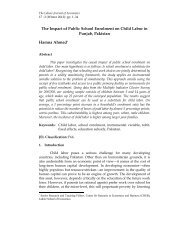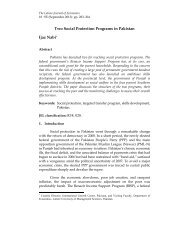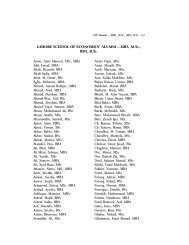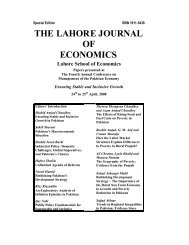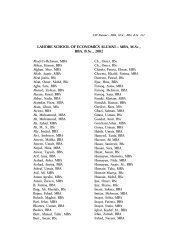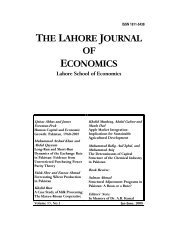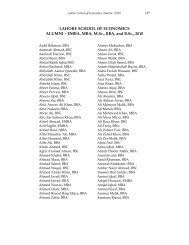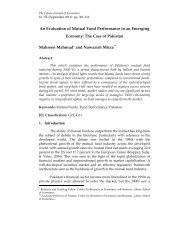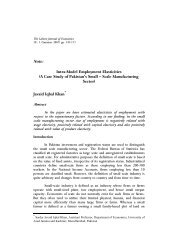Special Edition-07.pdf - Lahore School of Economics
Special Edition-07.pdf - Lahore School of Economics
Special Edition-07.pdf - Lahore School of Economics
Create successful ePaper yourself
Turn your PDF publications into a flip-book with our unique Google optimized e-Paper software.
162<br />
Naheed Zia Khan<br />
Before exploring the implications <strong>of</strong> the size and significance <strong>of</strong><br />
agricultural subsidies <strong>of</strong> developed countries, it will be helpful to have an<br />
overall idea <strong>of</strong> the players’ stakes in the international market for agricultural<br />
products. Table-6 presents the share <strong>of</strong> leading exporters <strong>of</strong> agricultural<br />
products in the world receipts from agricultural exports between 1980-<br />
2002. The most significant development to be noted is that the US share<br />
declined by about 3% in 10 years to 1990, and the EU share increased<br />
markedly during the same period. This may be explained by Greece,<br />
Portugal and Spain, all having a comparative advantage in agriculture,<br />
joining the EU, then the European Community. 10<br />
Table-6: International Trade in Agricultural Products: Leading<br />
Exporters (1980-2002)<br />
World export <strong>of</strong> agricultural products<br />
Country/Group<br />
(% share in total export receipts)<br />
1980 1990 2000 2002<br />
EU15 32.8 42.4 39.6 40.1<br />
US 17.0 14.3 12.9 11.8<br />
Canada 5.0 5.4 6.3 5.6<br />
Brazil 3.4 2.4 2.8 3.3<br />
China 1.5 2.4 3.0 3.2<br />
Australia 3.3 2.8 3.0 2.9<br />
Argentina 1.9 1.8 2.2 2.2<br />
Thailand 1.2 1.9 2.2 2.0<br />
Indonesia 1.6 1.0 1.4 1.5<br />
Malaysia 2.0 1.8 1.5 1.5<br />
New Zealand 1.3 1.4 1.4 1.4<br />
Russia - - 1.4 1.3<br />
Chile 0.4 0.7 1.2 1.2<br />
India 1.0 0.8 1.2 1.1<br />
Source: WTO (2003)<br />
<br />
Russian Federation.<br />
10 This observation provides food for thought for why after 1990 the US became<br />
interested in the expansion <strong>of</strong> NAFTA. Also, on the issue <strong>of</strong> farm subsidies the two<br />
powers, EU and the US, were likely to make or break the UR negotiations. Each insisted<br />
that an unsatisfactory deal will be rejected, even if that means no deal at all (see “GATT:<br />
The Eleventh Hour” The Economist, December 4, 1993).



